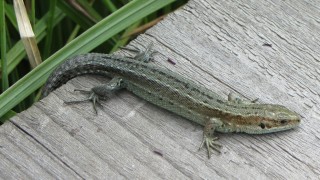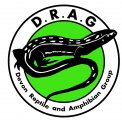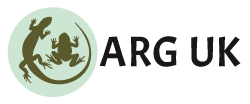About us
About Us
Welcome to the Devon Reptile and Amphibian Group (DRAG) website.

Who are we?
We are a friendly, volunteer led group who have a passion for reptiles and amphibians and a willingness to share this passion, knowledge and experience with others.
We are made up of individuals with a variety of backgrounds and interests, from those with a general interest in the natural world to experienced herpetologists, ecologists and conservationists.
What do we hope to achieve?
Here are some of the group’s key aims and objectives:
- To identify and protect important reptile and amphibian sites in the county of Devon
- To support partner groups and organisations in conserving these sites
- To better understand species distributions, populations and potential negative trends and to help mitigate or reverse those trends
- To promote conservation through education and public engagement
- To collect and submit data to Devon Biodiversity Records Centre (DBRC)
How do we achieve this?
- Through monitoring and surveying of known sites
- Through visiting potential sites of interest
- By working along with landowners and organisations in providing advice and consultations on habitat management and species monitoring
- By encouraging everyone to report sightings of reptiles and amphibians on Record Pool either using the Devon Reptile and Amphibian Group (DRAG) website (under the 'Record a sighting' tab) or by visiting https://www.recordpool.org.uk.
- By holding events and by providing resources that aim to raise awareness and educate people about these amazing animals and their habitats
- By recruiting more members
News
News
Pond creation at Chudleigh Knighton Heath December 2010
Nicky Green
Chytrid fungus December 2010
Nicky Green
DRAG AGM at Paignton Zoo 16th October 2010
Curator Mike Bungard gave us an exclusive guided tour of the new amphibian ark, which is an amphibian centre with biosecure collections of endangered species. After ensuring that we had disinfected shoes, donned shoe ‘covers’ and white coats, we explored the new rooms full of vivariums (being careful not to touch anything!) full of newly arrived tropical frogs, toads and caecilians (limbless amphibians that resemble snakes).
It was a sobering thought that many of these endemic animals are not found anywhere else in the world, neither in the wild nor captivity. We also had presentations on reptile translocation by Mabel Cheung and brand new field research on native reptiles by Vicky Buller. The DRAG Constitution was agreed with minor amendments. The AGM minutes have already been distrubuted via email, and are also available on request. Mabel Cheung
Great Crested Newts at Chudleigh Knighton Heath 2010
The ponds at Chudleigh Knighton Heath have been monitored during the newt breeding season to assess if there are any surviving populations of the great crested newt. The great news is that on each occasion GCN’s were found!
Since April until the end of May, six surveys took place on three ponds that are situated on either side of the Chudleigh Knighton road heading towards Bovey Tracey. There is a pond which has previously been checked for the presence of great crested newts (pond one) and two ponds on the other side of the road situated close to a bridal path (ponds two and three). Surveys included searching for eggs, bottle trapping and torch surveying. Either two or all three methods were done on each occasion. We also tested the pH of the water which did vary slightly between the ponds.
Eggs of the GCN were found in pond one but unfortunately not in high numbers. Over time, the ponds became heavily covered with foliage which made it difficult to conduct egg searching and torch surveys. Palmate newts were found in all three of the ponds but mainly in ponds one and two. It was fantastic to find great crested newts in pond one on each occasion via the bottle traps.
The highest count was on the last survey (31st May) where we found three males and one female. The week before another female was caught which had a distinguished mark which allowed us to identify her without handling. This gave us a total population count of a minimum of five adults.
Since the last survey the ponds will continue to be monitored to establish whether the ponds will dry out completely. During the dry spell in June, the ponds water level had dropped by approximately one meter in pond one and had reduced by 0.75m around the edges of ponds two and three. The pH will also continue to be monitored throughout the summer to see if there are any changes.
Sharon Green
DRAG Launch Event 2nd May 2010
Thirty people, including families with children, and people who just wanted to find out more about ‘herps,’ an affectionate abbreviation for reptiles and amphibians, came for a guided walk around the Devon Wildlife Trust reserve and take part in children’s activities in the community hut.
Despite the blazing sun, visitors on the guided walk were rewarded with yellowhammer and Dartford warbler in song, plus an adder and a slow worm making appearances – but these didn’t hang around for long in the heat! In the hut, a palmate newt in a vivarium allowed for visitors to get a close encounter.
Children had the opportunity to draw pictures of what they had seen on the day and look at exhibits such as a snake slough. DRAG volunteers were present throughout the morning to provide information and advice on reptiles and amphibians. Mabel Cheung
Resources
Resources
Introduction to Reptile Identification and Surveying
Adder Bites - Helpful Links
Dogs and Adders
Dogs 'n' Adders - Information Leaflet
Snakes in Gardens
Snakes are fascinating creatures and for many, finding one in the garden is a real treat and a memorable experience.
However, for many others this can be a disconcerting and even worrying situation. This can be as a result of misunderstandings often fed by negative and often inaccurate media reports and rumours. Please be assured, though, that there is no reason to worry and that these situations can be resolved fairly easily.
The vast majority of reported snake sightings in gardens turn out to be either a Grass Snake or a Slow worm (a legless lizard which resembles a snake). Both species are harmless and are best left alone.
We only have one venomous snake species, the Adder, which is rarely found in gardens unless your property is situated close to favourable habitat. Even then, the adder is a very shy animal and avoids human activity whenever it can. Again, the best course of action is to leave it alone and allow it to move off when it’s ready. The likelihood is that it is just passing through anyway.
Occasionally, DRAG gets asked about relocating snakes. For all kinds of practical reasons this isn’t something we would do and would actually be the opposite of what our group encourages which is reptile conservation.
The best recommendation we can provide is to learn as much as possible about the reptile you have seen in your garden. We will happily help you identify it and provide related advice such as understanding which features of your garden have likely attracted it in the first place.
Please don’t hesitate to get in touch and send a photo or description of the snake to devonrag@hotmail.com or to our Facebook group at http://www.facebook.com/groups/DevonARG/.
It would really help if you could record your sighting on Record Pool either using the Devon Reptile and Amphibian Group (DRAG) website (under the 'Record a sighting' tab) or by visiting https://www.recordpool.org.uk.
Please remember that reptiles are protected under UK law.
Species Guides
Species Guides
Devon's Reptiles
In the UK we have 6 native reptile species, each of which can be found in Devon.
To find out more about a particular species click on it's name which will then jump to the relevant information.
Adder Vipera berus
Grass Snake (or Barred Grass Snake) Natrix helvetica
Smooth Snake Coronella austriaca
Slow Worm Anguis fragilis
Viviparous (or Common) Lizard Zootoca vivipara
Sand Lizard Lacerta agilis
Devon's Amphibians
In the UK we have 7 native amphibian species, 6 of which can be found in Devon.
To find out more about a particular species click on it's name which will then jump to the relevant information.
Great Crested Newt (Triturus cristatus)
Smooth Newt (Lissotriton vulgaris)
Palmate Newt (Lissotriton helveticus)
Common Toad (Bufo bufo)
Natterjack Toad (Epidalea calamita)
Common Frog (Rana temporaria)
For information on the adder please click on the fact sheet link in blue or you can watch the animated video below.
Grass Snake Natrix helvetica
Tadpoles
We've all seen them right, often in large numbers early in the year in even the smallest bodies of water ..... but what are tadpoles?
Tadpoles are the larval stage in the life cycle of an amphibian. In the UK the tadpoles we most often encounter will belong to the Common frog (Rana temporaria) or Common toad (Bufo Bufo).
Amphibians go through several stages before reaching their adult form. This incredible process is known as metamorphosis. Below is a video showing in detail how this process takes place.
Membership
Membership
Why become a member?
Well, big things start in small ways and becoming a member of the Devon Reptile and Amphibian Group (DRAG) is one step you can take towards protecting the reptiles and amphibians in your local area and beyond.
Whether you’re dropping us a line by email, submitting a photo or participating as a volunteer in a reptile or amphibian survey your contribution is valued all the same. Everything we can do to keep the ‘conversation’ going is great for the reptiles and amphibians of Devon.
The more members that join the greater the potential for activity. Put simply, without members we couldn’t do what we do and it would be great to have you join us.
Membership benefits:
- · Become part of a group of like minded individuals and keep in touch via social media or email
- · Invitations to events, training and volunteering opportunities
- · A quarterly newsletter
- · Opportunities to see and work with elusive and hard to find species
- · Opportunities to learn new skills
- · Gain practical experience in conservation
- · The opportunity to have a positive, lasting impact on Devon’s wildlife
Some of the activities that you will be invited to can include talks by local experts, guided walks, bioblitzes and even species identification and survey skills training.
Opportunities for volunteering could include surveying, habitat management or helping out at nature festivals.
Have a voice in what we do.
We value your feedback and encourage it.
For example:
- · Do you have an idea for an event or training?
- · Is there a site near you that we are unaware of?
Drop us a line and let us know at devonrag@hotmail.com.
How do I join?
If you would like to become a member please send your request by email to devonrag@hotmail.com.
FAQ
- · Question: How much does membership cost?
Answer: Membership is free to join.
- · Question: How long will my membership last?
Answer: Currently, membership is on a rolling annual basis.
- · Question: Do I need special knowledge, qualifications or experience to become a member?
Answer: No. There are no prerequisites, nor is there any minimum level of commitment required.
- · Question: Can I be a member but not volunteer?
Answer: Yes. Whilst volunteering makes a big difference to what we do, we totally understand that not everyone’s circumstances allow for it.
- · Question: How do I cancel my membership?
Answer: You can cancel your membership at any time by sending your request to devonrag@hotmail.com.
Photo gallery
Photo Gallery
Contact us
Contact Us
If you want to join DRAG and our email group, or have a general query, please contact a member of DRAG admin:
Please be patient with us, this email address is not checked every day!
Upcoming Events
Upcoming events will be listed here.
Latest News
- A tale of six lizards
25/07/2021 1:49 pm - Upcoming Talk
15/02/2016 3:22 pm - Reptile Training Oppourtunity
28/04/2014 9:40 am - DRAG great crested newt training courses delivers the goods
23/05/2013 10:46 pm - Sand lizard summary and pics
09/05/2013 10:23 pm
© Devon Reptile & Amphibian Group (DRAG)
Website hits: 71100
View All | Find out how to get a mini-website for your ARG
© ARG UK Local Groups mini-websites 2025
Wind powered websites by Aye-aye Design.

